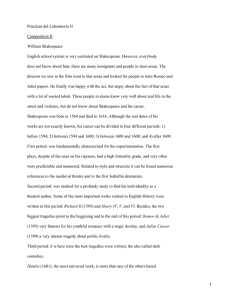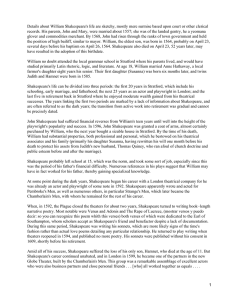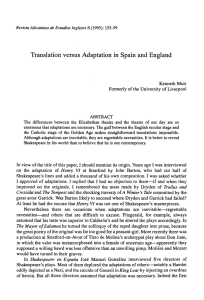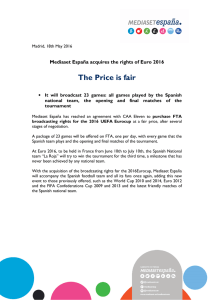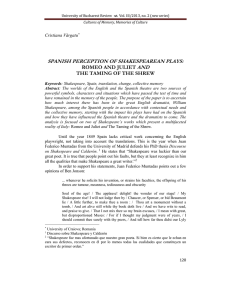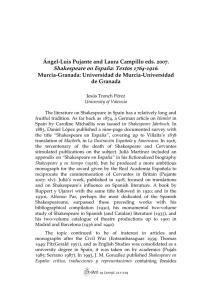Shakespeare in Spanish Translations
Anuncio
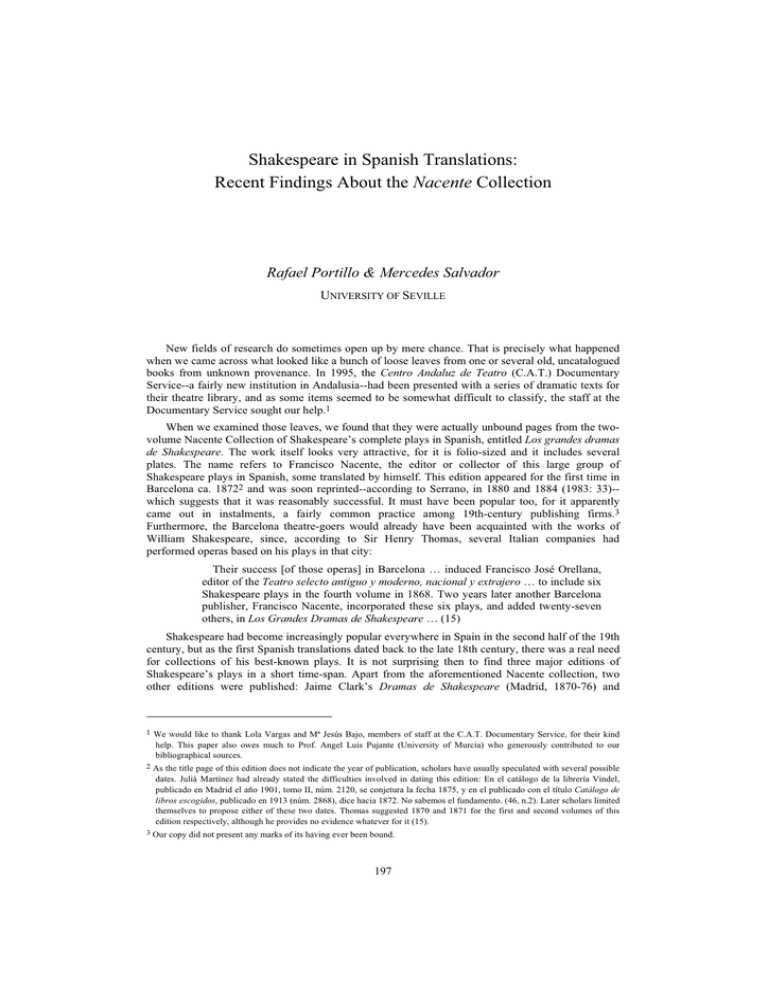
Shakespeare in Spanish Translations: Recent Findings About the Nacente Collection Rafael Portillo & Mercedes Salvador UNIVERSITY OF SEVILLE New fields of research do sometimes open up by mere chance. That is precisely what happened when we came across what looked like a bunch of loose leaves from one or several old, uncatalogued books from unknown provenance. In 1995, the Centro Andaluz de Teatro (C.A.T.) Documentary Service--a fairly new institution in Andalusia--had been presented with a series of dramatic texts for their theatre library, and as some items seemed to be somewhat difficult to classify, the staff at the Documentary Service sought our help.1 When we examined those leaves, we found that they were actually unbound pages from the twovolume Nacente Collection of Shakespeare’s complete plays in Spanish, entitled Los grandes dramas de Shakespeare. The work itself looks very attractive, for it is folio-sized and it includes several plates. The name refers to Francisco Nacente, the editor or collector of this large group of Shakespeare plays in Spanish, some translated by himself. This edition appeared for the first time in Barcelona ca. 18722 and was soon reprinted--according to Serrano, in 1880 and 1884 (1983: 33)-which suggests that it was reasonably successful. It must have been popular too, for it apparently came out in instalments, a fairly common practice among 19th-century publishing firms.3 Furthermore, the Barcelona theatre-goers would already have been acquainted with the works of William Shakespeare, since, according to Sir Henry Thomas, several Italian companies had performed operas based on his plays in that city: Their success [of those operas] in Barcelona … induced Francisco José Orellana, editor of the Teatro selecto antiguo y moderno, nacional y extrajero … to include six Shakespeare plays in the fourth volume in 1868. Two years later another Barcelona publisher, Francisco Nacente, incorporated these six plays, and added twenty-seven others, in Los Grandes Dramas de Shakespeare … (15) Shakespeare had become increasingly popular everywhere in Spain in the second half of the 19th century, but as the first Spanish translations dated back to the late 18th century, there was a real need for collections of his best-known plays. It is not surprising then to find three major editions of Shakespeare’s plays in a short time-span. Apart from the aforementioned Nacente collection, two other editions were published: Jaime Clark’s Dramas de Shakespeare (Madrid, 1870-76) and 1 We would like to thank Lola Vargas and Mª Jesús Bajo, members of staff at the C.A.T. Documentary Service, for their kind help. This paper also owes much to Prof. Angel Luis Pujante (University of Murcia) who generously contributed to our bibliographical sources. 2 As the title page of this edition does not indicate the year of publication, scholars have usually speculated with several possible dates. Juliá Martínez had already stated the difficulties involved in dating this edition: En el catálogo de la librería Vindel, publicado en Madrid el año 1901, tomo II, núm. 2120, se conjetura la fecha 1875, y en el publicado con el título Catálogo de libros escogidos, publicado en 1913 (núm. 2868), dice hacia 1872. No sabemos el fundamento. (46, n.2). Later scholars limited themselves to propose either of these two dates. Thomas suggested 1870 and 1871 for the first and second volumes of this edition respectively, although he provides no evidence whatever for it (15). 3 Our copy did not present any marks of its having ever been bound. 197 198 RAFAEL PORTILLO & MERCEDES SALVADOR Guillermo Macpherson’s Dramas de Shakespeare (Madrid, 1873), all of which were trying to meet public demand. Nacente’s edition is by far the most ambitious of the three (although it depends heavily on previous French versions) as it includes 33 Shakespeare plays in Spanish. Nacente surely intended to present all 37 plays in this edition, but the project was finally thwarted, for the reasons Henry Thomas points out: When the second volume [of the Nacente edition] came out in 1871, Spanish readers had all Shakespeare’s plays available in prose translations, except The First Part of King Henry VI, The Winter’s Tale, and Titus Andronicus. Political and economic difficulties preceding the outbreak of the Second Carlist War no doubt prevented the completion, as it delayed the success, of the venture; but after the war ended in 1876, the volumes were more than once reprinted. (15)4 After inspection, we noticed that the aforementioned leaves already included The Two Gentlemen of Verona and The Merchant of Venice, a fact Angeles Serrano had overlooked in her two wellknown essays Bibliografía shakespeariana (1983) and Las traducciones de Shakespeare en España: el ejemplo de Othello (1988). Owing to this mistake, she assumed that the first Spanish translation of Two Gentlemen had first appeared in Martínez Lafuente’s Obras completas (Valencia, 1915): En 1915 aparece el intento más completo de obtención de la Obra Shakespeariana, esta vez a cargo de Rafael Martínez Lafuente … También habría que destacar en esta colección que en ella se incluye la primera traducción española de Two Gentlemen of Verona … (1983: 87) There is no sign, moreover, that this play might have been added to those unbound volumes by the publisher of a later edition, or by any other reader or collector of Shakespeare’s works, since the first page of Two Gentlemen--Los dos hidalgos de Verona, in the Spanish translation--is printed right after the notes for Hamlet. Besides, Juliá Martínez refers to page numbers which coincide exactly with those in our copy, although he leaves out the numbers corresponding to Two Gentlemen and Merchant. We may assume then, that those two plays were simply missing in the copy used by Juliá Martínez himself, which allows us to conclude that Two Gentlemen was indeed first published in Spanish ca. 1872, much earlier than the date proposed by Serrano, who was probably led astray by Juliá Martínez’s influential work Shakespeare en España (1918). There he refers to Two Gentlemen in the following terms: Hasta que, con motivo del tercer Centenario de la muerte de Shakespeare, no ha empezado a publicar la colección de las obras completas de aquel autor, hecha por la Casa “Prometeo” en Valencia, y traducida por el señor R. Martínez Lafuente, faltaba en España una versión de esta comedia. (53)5 However, regardless of previous critical opinions, it was Alfonso Par--considered by Entrambasaguas as “the first Spanish Shakespearean scholar” (80)--who eventually did provide a complete list of the plays contained in Nacente’s collection, in his Contribución a la Bibliografía Española de Shakespeare (1930). According to Par, Two Gentlemen does indeed appear in Nacente’s edition (44), as the second play after Hamlet, and is followed by Julius Caesar, which in turn precedes Merchant, just as we have attested after examining our copy. Par obviously had access to a complete edition of the Nacente collection, which he could have purchased or simply consulted in a public library. At any rate, it must have been fairly easy to come by in Barcelona, where Par lived and where he was murdered in the course of the Spanish Civil War.6 4 Thomas does not seem to take into account Much Ado About Nothing, which is not included in Nacente’s edition, either. 5 Likewise, another scholar, Ruppert y Ujaravi, in his Shakespeare en España (1920) fails to ascribe either Two Gentlemen or Merchant to the Nacente collection (32). 6 Henry Thomas describes the circumstances of his death in most vivid terms: Alfonso Par … was a predestined victim of the Red Terror when the Civil War broke out in 1936 … On 26 August of that year some gentlemen in a car called on him, ostensibly on business, and invited him for a ride. The ride ended, as such rides usually did, at La Rabassada, a Barcelona pleasure resort … His dead body was picked up there not long afterwards. (7) Sederi VIII (1997) SHAKESPEARE IN SPANISH TRANSLATIONS 199 A collation of the data obtained from the Nacente copy at the C.A.T. library, and the information provided by both Par’s Contribución, and Juliá Martínez’s Shakespeare en España, enable us to draw the following complete and, hopefully definitive, list of Nacente’s plays. They appear in the same order as in those two volumes; the translators’ names, together with page numbers are here indicated too. VOLUME I: Hamlet, Leandro Fernández de Moratín, 5-51; notes: 52-64.7 Los Dos Hidalgos de Verona, Francisco Nacente, 65-90. Julio César, Francisco Nacente, 91-118. El Mercader de Venecia, Gregorio Amado Larrosa, 119-147. Comedia de los Errores, Francisco Nacente, 149-170. Otelo ó el Moro de Venecia, Laureano Sánchez Garay, 171-208. Macbet (sic), Gregorio Amado Larrosa, 209-234. Una Furia Domeñada, Pablo Soler, 235-266. Romeo y Julieta, Manuel Hiráldez de Acosta, 267-307.8 Troilo y Crésida, Pablo Soler, 309-346. Pericles, Príncipe de Tiro, Eudaldo Viver, 347-373. Bien está lo que bien acaba, Eudaldo Viver, 375-408. La Tempestad, Pablo Soler, 409-431. Ricardo III, Manuel Hiráldez de Acosta, 433-476. Penas de Amor Perdidas, Eudaldo Viver, 477-508?9 Antonio y Cleopatra, Francisco Nacente, 509-546. Como Queráis, Eudaldo Viver, 547-577.10 El Rey Lear, Francisco Nacente, 579-616. VOLUME II: Cimbelino, Eudaldo Viver, 5-46. Las Alegres Comadres de Windsor, Francisco Nacente, 47-77. Enrique VIII, Francisco Nacente, 79-112. La Duodécima Noche ó lo que querais, Eudaldo Viver, 113-141. El Rey Juan, Francisco Nacente, 143-170. Medida por Medida (La Pena del Talión), Francisco Nacente, 171- 200.11 Ricardo II, Francisco Nacente, 201-230. Timón de Atenas, Eudaldo Viver, 231-259. Sueño de una Noche de Estío, Francisco Nacente, 261-283. Enrique IV (primera parte), Francisco Nacente, 285-317.12 Coriolano, Eudaldo Viver, 319-359. Enrique VI (segunda parte), Eudaldo Viver, 361-396. Enrique VI (tercera parte), A.R. y F.N., 397-430.13 7 Pages 21-28 are missing from the play, but the translator’s notes are extant. 8 This entire play together with the last few pages of Una Furia domeñada are missing in the C.A.T. copy. 9 This play is not complete in the C.A.T. copy and, as Juliá Martínez does not refer to specific page numbers of this particular work, we assume that 508 is probably the last page. 10 The last few pages of this play are missing. 11 There is a group of missing pages which affect the end of Medida and the beginning of Ricardo II. 12 Several pages at the end of this play are badly damaged. Sederi VIII (1997) 200 RAFAEL PORTILLO & MERCEDES SALVADOR Enrique IV (segunda parte), Francisco Nacente, 431-463. Enrique V, Francisco Nacente, 467-498. All the errors concerning Nacente’s collection in previous scholarly studies may be due to the fact that it has usually been dismissed as a second-rate edition, since most of its plays had been translated from French versions. Serrano (1983), for instance, regards those as “false translations” (31), but she seems to overlook their due merit, for they represent the first attempt at offering Shakespeare’s complete dramas to the Spanish public. At the same time, it constitutes the first Spanish publication of the following plays: The Two Gentlemen of Verona, The Comedy of Errors, The Taming of the Shrew, Troilus and Cressida, Pericles, All’s Well that Ends Well, Love’s Labour’s Lost, Antony and Cleopatra, King Lear, Cymbeline, Henry VIII, Richard II, Timon of Athens, A Midsummer Night’s Dream, Henry IV (Part 1), Coriolanus, Henry VI (Part 2), Henry VI (Part 3), Henry IV (Part 2) and Henry V. As for the “poor” quality of the translations, a comparative analysis of Shakespeare’s Two Gentlemen (I.i.28-35) and both Francisco Nacente’s and Astrana Marín’s Spanish versions, yields surprising and unexpected results: VALENTINE. No, I will not; for it boots thee not. PROTEUS.What? VAL. To be in love; where scorn is bought with groans; Coy looks, with heart-sore sighs; one fading moment’s mirth, With twenty watchful, weary, tedious nights; If haply won, perhaps a hapless gain; If lost, why then a grievous labour won; How ever, but a folly bought with wit, Or else a wit by folly vanquished. Francisco Nacente translates the same passage as follows: VAL. No es ese mi intento; por el contrario, te compadezco. PRO. ¿Por qué? VAL. Porque estás enamorado; amar, es comprar desprecios con lamentos, miradas desdeñosas con suspiros de dolor; es trocar por un breve instante de placer veinte noches de ansiedades y desvelos; si triunfais, funesta es vuestra victoria; si salís burlados, recogeis una herencia de crueles penas. ¿Qué resta en último resultado? una necedad comprada á fuerza de ingenio o un ingenio vencido por la necedad ó locura. Luis Astrana Marín--usually regarded in Spain as a compulsory reference for translators of Shakespeare’s works-- renders a not-too different version: VAL. No, no lo deseo; he hecho por ti voto de compasión. PRO. ¿Por qué? VAL. Por estar enamorado. Amar es comprar desprecios con lamentos, miradas de desdén con suspiros de dolor; es cambiar por un instante de placer veinte noches de ansiedades y desvelos. Si se triunfa, cara cuesta la victoria. Si se nos engaña, solo conservamos desastres. ¿Qué queda, pues del amor? Una tontería conseguida a fuerza de ingenio por la tontería o la locura. The two Spanish texts cited here are both prose and rather free versions of Shakespeare’s original, but their similarities do not seem to point to a mere coincidence. A detailed analysis of all 13 Neither this play nor the following two have been preserved in the C. A. T. copy, but Juliá Martínez provides the three titles and the names of their translators--or just initials, as in this case. F. N. stands most likely for Francisco Nacente; A. R. may stand for Antonio Romero Ortiz, who had already translated Richard III in 1853, but this is mere conjecture. Sederi VIII (1997) SHAKESPEARE IN SPANISH TRANSLATIONS 201 Spanish translations of Two Gentlemen might perhaps prove that Nacente’s version is not as “false” or as “poor” as most scholars have asserted. We propose that in the future this collection be taken into consideration, for it is a real landmark in Spanish translations of Shakespeare’s drama. In our view, Nacente’s contribution is as relevant as those of Clark and Macpherson. WORKS CITED Astrana Marín, Luis, ed. and trans. 1967: Shakespeare: Obras Completas. Madrid, Aguilar. Clark, Jaime. 1870-76?: Obras de Shakespeare. 5 vols. Madrid, Medina y Navarro. Entrambasaguas, Joaquín de. 1939: En Torno a Shakespeare en España. > La Determinación del Romanticismo Español. Barcelona: 71-81. Juliá Martínez, Eduardo. 1918: Shakespeare en España. Madrid, Revista de Archivos, Bibliotecas y Museos. Macpherson, Guillermo. 1873: Dramas de Shakespeare. 8 vols. Madrid, Perlado Páez. Martínez Lafuente, Rafael. 1915: Shakespeare: Obras Completas. 12 vols. Valencia, Prometeo. Nacente, Francisco, ed. and trans. 1930: Los grandes dramas de Shakespeare. 2 vols. Barcelona, La Enciclopedia Ilustrada, n.d. Par, Alfonso. 1930: Contribución a la Bibliografía Española de Shakespeare. Barcelona, Publicaciones del Instituto del Teatro Nacional. Ruppert y Ujaravi, Ricardo. 1920: Shakespeare en España. Traducciones, imitaciones e influencias de las obras de Shakespeare en la literatura española. Madrid, Revista de Archivos, Bibliotecas y Museos. Serrano Ripoll, Angeles. 1983: Bibliografía Shakespeariana. Alicante, Publicaciones del Instituto de Estudios Alicantinos. ---. 1988: Las traducciones de Shakespeare en España: el ejemplo de Othello. Valencia, Arcos. Shakespeare, William. 1969: The Two Gentlemen of Verona. Ed. Clifford Leech. London, Methuen. Thomas, Henry (Sir). 1949: Annual Shakespeare Lecture: Shakespeare in Spain. > Proceedings of the British Academy. Vol. XXXV. London: 3-24. *** Sederi VIII (1997)
